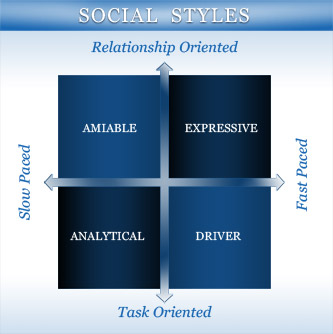
Leadership
Social Styles
There are four basic personality style categories that everyone falls into. Once you understand these styles and can easily recognize them in others, you will be able to “flex your style” to mirror the characteristics of the person you are dealing with. Whether people realize it or not, they respond better to people that are like them. They feel a connection with the other person that they might not be able to articulate but they recognize that the other person “gets them”.

Understanding personality styles and changing your communication behavior to mirror someone else’s is not deceptive; rather it is a way to form a stronger bond with that person because you have taken the time to understand how they look at the world and use language and thoughts that are meaningful to them. Without this understanding, we continue to make the same mistake over and over again. We suppose everyone thinks like we do, is motivated by the same things we are and if we just keeping banging them over the head, they will change and perform.
Michael learned these styles when he was CEO of a software company. It dramatically changed his work relationships and the teams productivity. When he understood what his fellow colleagues needed in order to do their job, the results were undeniably incredible. Michael saw such an impact on how others reacted and responded to him when he mirrored their style that he decided to bring this new way to communicate home and use it in his personal relationships with friends and family. The results were the same. Michael was able to dramatically improve his relationships with his children and family because he knew what was important to them and based his conversations and expectations around how they viewed the world. It made such a noticeable difference in his family that everyone read the material Michael had learned at work and it continues to be the foundation for the rich relationships he experiences today.
There are four basic personality styles:
- Driver
- Analytical
- Expressive
- Amiable
Statistics show that there are an equal number of people in each style. And while everyone has a primary style, we all have a secondary style as well. Sometimes a person’s primary style is very obvious, other times it might be hard to determine. Michael finds managing individuals different based on their style is much clearer and easier with this four quadrant approach as to the more complex, tough to remember Myers Briggs formulas.
Driver Style: A Driver is very determined and focused. He/she is completely goal driven; everything is about accomplishing the goal. Strong leaders and highly successful salespeople are drivers; they measure their progress strictly by results. Their satisfaction comes from getting the job done and winning.
| Attributes of the Driver | |||
|---|---|---|---|
| Strengths | Under Stress | Positives | Negatives |
|
independent candid decisive pragmatic efficient |
autocratic pushy dictatorial insistent |
forceful confident risk-taker competent change agent sense of urgency |
aloof stubborn critical ruthless boring too serious |
Expressive Style: An Expressive is the fun and life of the party person. They are about enjoying the journey in life and business. They are wonderful because they bring humor to meetings and remind us not to be so serious. They are great communicators, collaborators, and evangelists for the company or product. Expressives are great marketing people and sometimes sales people (if managed properly). They measure their success by recognition (awards and applause) and the attention they receive whether good or bad.
| Attributes of the Expressive | |||
|---|---|---|---|
| Strengths | Under Stress | Positives | Negatives |
|
outgoing enthusiastic persuasive fun loving spontaneous |
will unleash an angry personal attack strong language high volume emphatic gestures |
flexible energetic socially adept inspirational exciting initiator |
inconsistent disorganized loud aggressive manipulator opinionated |
Amiable Style: An Amiable is the ultimate team player as they will try to get along with everyone. They focus on the friendships and relationships in their professional and personal life. Amiables do well in careers that are people orientated such as Human Resources. They measure their success by the warmth and attention they receive from others.
| Attributes of the Amiable | |||
|---|---|---|---|
| Strengths | Under Stress | Positives | Negatives |
|
cooperative supportive diplomatic patient loyal |
acquiesces to others will comply with request, (but heart is not in agreement) may not do what they say |
idealistic helpful easy-going caring insightful |
impractical push-over gullible passive pleaser self-deprecating |
Analytical Style: The Analytical is the stable, data driven person who often keeps the other styles rooted in reality. They are the voice of logic and reason. They define the technical requirements of products or services and manage the financial information. Analytical people do well in careers that involved data research & development. Most engineers and accountants are analytical. They measure their success by their ability to prove that their concept or work is accurate. They want to be intellectually superior.
| Attributes of the Analytical | |||
|---|---|---|---|
| Strengths | Under Stress | Positives | Negatives |
|
logical thorough serious systematic prudent |
avoids conflict or confrontation, (leaves physically or emotionally) sulks may intellectualize with cold detached logic doesn't let on insides are churning |
practical factual unflappable knowledgeable methodical |
uncreative data-bound boring plodding critical |
